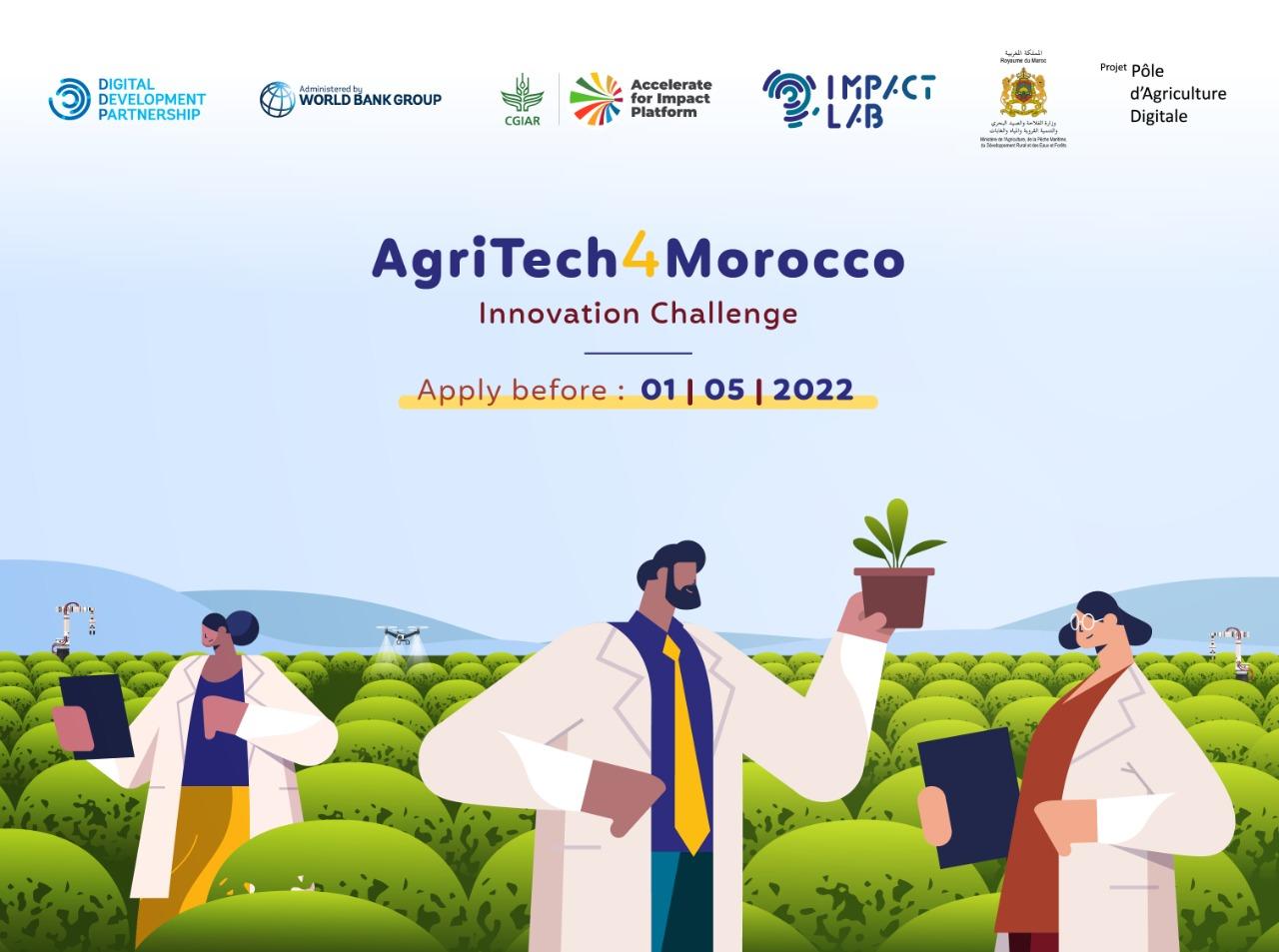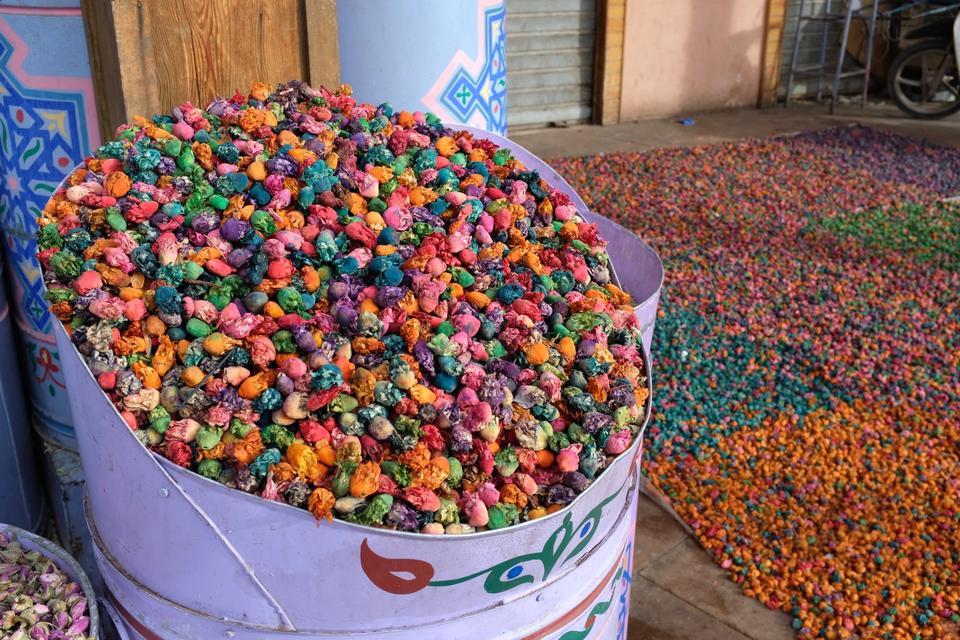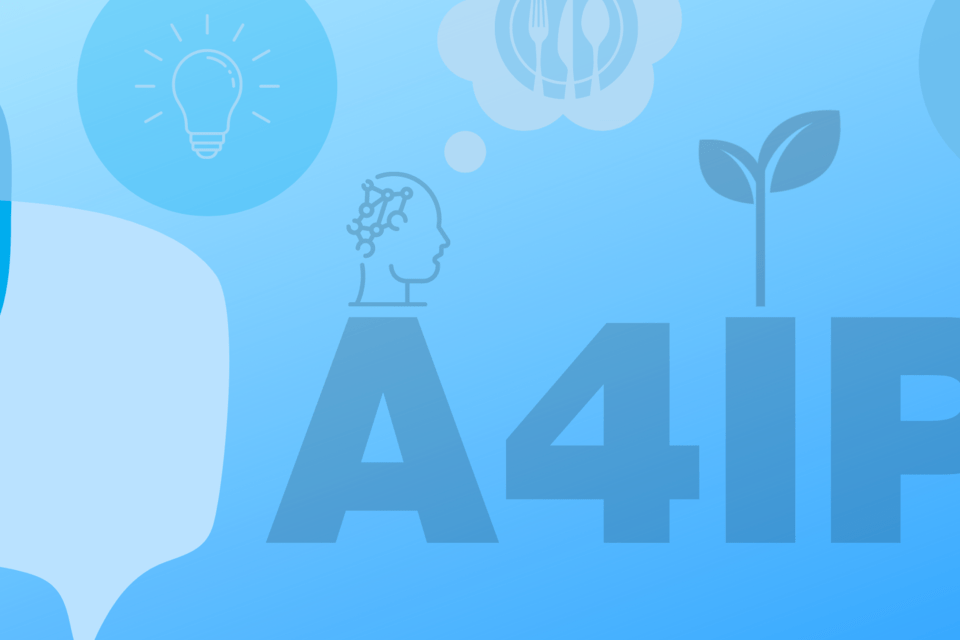Press and News Open Call for Disruptive Agri-Tech Solutions to Support Morocco’s Generation Green 2020-2030 Strategy

CGIAR Accelerate Impact Platform, IMPACT Lab, World Bank and Trust Fund Digital Development Partnership, the Moroccan Ministry of Agriculture, Maritime Fisheries, Rural Development and Water and Forests (MAPMDREF), and PAD Project Launch the AgriTech4Morocco Innovation Challenge.
Casablanca, March 30, 2022 – The CGIAR Accelerate for Impact Platform, World Bank, and IMPACT Lab have announced an open call for applications for the AgriTech4Morocco Innovation Challenge. It is designed to scout, select, and accelerate disruptive solutions aimed at responding to the pressing challenges impacting the Moroccan agri-food sector. This initiative is supported by the Digital Development Partnership, administered by the World Bank Group, in partnership with the MAPMDREF, and Pôle d’Agriculture Digitale (PAD Project).
During today’s virtual event, public sector players, scientists, and business experts convened to shed light on the need to foster effective linkages between pioneering research, technology, and entrepreneurship to create a supportive ecosystem for innovation in the agri-food sector. Panellists also highlighted the strong commitment demonstrated from the Moroccan public and private sector to modernize the agriculture sector with the latest technological developments.
In February 2020, the Moroccan government launched the “Generation Green 2020-2030 Strategy”, introducing a shift in the way Morocco envisions agricultural development. The new strategy strives to capitalize on the achievements of the past Green Morocco Plan and is grounded on two pillars. The first is aimed at enhancing the human element through the emergence of a new generation of agricultural middle class and the empowerment of young entrepreneurs and rural populations. The second area is focused on developing a resilient and sustainable agriculture sector by adopting climate smart practices, introducing new technologies, digitalizing agricultural services, and improving the quality and capacity for innovations.
“The opportunities offered by digital technologies enable the modernization of the whole agriculture value chains by, amongst other: (i) moving production towards precision farming, responding to the imperatives of productivity increase as well to the challenges posed by climate changes; (ii) creating new and quality jobs upstream and downstream the primary production; and (iii) adding value to the production through better marketing, quality control, traceability, etc. The World Bank is excited to support Morocco in this ambitious program”,
states Rémi Trier, Senior Agricultural Specialist, from the Agriculture and Food Global Practice at the World Bank.
Through Generation Green, the Government of Morocco recognizes the importance to support the country’s agriculture sector against climate hazards and changing weather patterns. Morocco is particularly susceptible to chronic drought as well as pest and disease pressure on crops and livestock. Climate variability is likely to exacerbate water scarcity, reduce yields, and increase the volatility of agricultural production. According to the Intergovernmental Panel on Climate Change’s sixth assessment report, future projections indicate warmer and drier conditions for Morocco as for the whole Mediterranean region. The Moroccan Ministry of Agriculture, Maritime Fisheries, Rural Development and Water and Forests estimates that drought hazards will lead decreasing trends in rainfalls by 11% by 2050. Combined with rising temperatures by 1.3°C, it is projected that Morocco will face a 25% decrease in available irrigation water.
In this context, the AgriTech4Morocco Innovation Challenge targets ground-breaking agri-tech solutions that seek to enhance efficiency, equity, and environmental sustainability for Morocco while aligning with Generation Green. Proposed innovations must demonstrate proof of concept or minimum-viable-product (i.e., service, technology, methodology, practice) and be applicable to the Moroccan agri-tech space.
“The organization of the AgriTech4Morocco Innovation Challenge demonstrates the engagement of the World Bank to support the declination of the axes of the new Green Generation 2020-2030 Strategy mainly that this strategy aims at creating a new generation of young entrepreneurs in the rural area and providing digitals e-services for 2 million connected farmers by 2030,”
states Majid Lahlou, Directorate of Information Systems at MAPMDREF.
The AgriTech4Morocco Innovation Challenge aims to shed light on the opportunities and challenges in the value chains in Morocco, and the role of entrepreneurs seeking to generate impact in the agri-tech space. Through the activities of the bootcamp and Acceleration Program, shortlisted participants will be guided with operational support, tools, and knowledge to consolidate, test, and scale their solutions. Innovators will be offered opportunities to network with scientists as well as private and public partners to foster long-term research and development collaboration.
“Nowadays, there is an emerging class of enthusiastic young entrepreneurs that are reframing the sector with futuristic, highly technological, and sophisticated solutions that we aim to scout and support though scientific, financial and access to market,”
says Gianpiero Menza, Senior Partnerships and Innovative Finance Officer at CGIAR.
The AgriTech4Morocco Innovation Challenge will be structured as follows.
Phase 1: Application
Applicants must submit their projects online through the dedicated portal by Sunday May 1, 2022 at 23:59 CET/21:59 GMT. The portal offers applicants the opportunity to be part of the larger community of ambitious founders, industry players, investors, and mentors, connect with likeminded innovators, and profile their solution to help gain exposure in the ecosystem.
Phase 2: Bootcamp
Following the one-month call for applications, the 20 promising innovations teams will be invited to participate in the bootcamp. With the support of CGIAR and IMPACT Lab experts, innovators will engage in a three-day training event designed to develop entrepreneurship tools through keynotes, mentoring sessions, and masterclasses to build towards a solid pitch deck. Innovations teams will pitch their solutions to a jury of sector experts who will select the 10 finalists who will be admitted to the next phase and awarded a ten-week Acceleration Program.
Phase 3: Accelerator Program
During the Acceleration Program, the top 10 innovators will be expected to dedicate a full-time effort to the program. CGIAR and IMPACT Lab experts will support them to structure the foundations of their projects through training workshops, facilitate networking with industry experts and advisors, and fundraise for their solution’s next steps.
Phase 4: Demo Day
The Demo Day will conclude the Acceleration Program in which the 10 finalists will pitch their solutions in front of a panel of investors and relevant stakeholders in July 2022.
Motivated individuals or organizations with a passion for developing innovative solutions that can positively disrupt the Moroccan agriculture and food sectors are encouraged to apply.
Applications must be submitted online here by Sunday May 1, 2022 at 23:59 CET/21:59 GMT.
Discover more on the AgriTech4Morocco Innovation Challenge website.
Questions can be submitted to [email protected]
Organizers
World Bank
The World Bank works with countries in the Middle East and North Africa to eliminate poverty and promote shared prosperity through strengthening human capital, supporting jobs and economic transformation, advancing gender equity, addressing fragility, and enabling green growth. The Agriculture and Food Global Practice within the World Bank provides knowledge, advice, and financial resources in low- and middle-income countries to transform food systems to reduce poverty and achieve green, resilient, and inclusive development.
Digital Development Partnership
Digital Development Partnership offers a platform for digital innovation and development financing, bringing public and private sector partners together to advance digital solutions and drive digital transformation in developing countries.
CGIAR Accelerate for Impact Platform
The Accelerate for Impact Platform (A4IP) is a venture space that builds on CGIAR’s legacy of Research and Innovation to support both incremental and transformational innovation by bridging science and entrepreneurship to address some of the world’s most pressing challenges at the nexus of agriculture, environment, and health. A4IP incubates and accelerates science-based innovations by valorizing existing or dormant research products in the precommercial-stage. A4IP connects CGIAR science with the innovation ecosystem and funds the most visionary teams to leverage scientific creativity through collaborations and cross pollination of knowledge to co-design novel breakthrough solutions for sustainable agriculture and climate action. A4IP generates both impact and the resources needed to support continued research in pursuit of the Sustainable Development Goals.
IMPACT Lab
IMPACT Lab is a startup and innovation accelerator that supports start-ups, corporates, and public institutions to help them address their growth challenges in Africa trough innovation. IMPACT Lab offers innovation consulting, operational support of internal innovation dynamics projects, and acceleration of innovative projects. IMPACT Lab aspires to support the development of new economic and social models by bridging between startups, public institutions, corporates, and research institutes through collaborative innovation.
Partners
Moroccan Ministry of Agriculture, Maritime Fisheries, Rural Development and Water and Forests
The Ministry of Agriculture, Maritime Fisheries, Rural Development and Water and Forests (MAPMDREF) - Department of Agriculture - is responsible for developing and implementing government policy in the agricultural field.
The Department of agriculture is also responsible, subject to the attributions devolved to other ministerial departments, of the other missions such as:
- Defining and implementing government’s agricultural development policy;
- Studying and developing intervention strategy aiming at improving and restructuring the agricultural structures;
- Taking the necessary steps to rationalize the use of water resources for irrigation;
- Developing and implementing government policy in the field of the promotion of agricultural production and ensuring the upgrading of professional agricultural organizations within the framework of production chains;
- Encouraging investment in the agricultural sector;
- Developing legal and regulatory texts related to agricultural activities;
- Collecting, analyzing and disseminating agricultural statistics and information;
- Defining and implementing the strategy in the areas of agricultural higher education, agricultural research and agricultural technical and professional training;
- Developing government policy on the safety of plants, animals and food products throughout the national territory and at its borders.
Le Pôle d’Agriculture Digitale (PAD Project)
Created as part of the Green Generation Strategy, Digital Agriculture Pole (PAD) is the first Agriculture 4.0 Research and Development and Innovation center bringing together eleven institutions of the main publics and private actors in agriculture sector in Morocco. The PAD mission is about bridging the gap between industry and academia, turning scientists and engineers’ ideas into commercially viable solutions to help farmers and agri-food businesses become more sustainable and profitable, using cutting-edge precision technologies, data-driven robotics and autonomous solutions.


